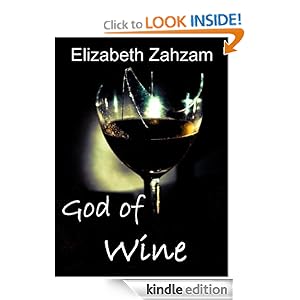Some experiences challenge
accepted ideas. In the last days, we’ve
seen the entire east coast region in a black out, cut off from transportation
and even communication. Yet this
vulnerability hasn’t brought on any foreign attack. The U.S. still has so much to offer other nations that its
presence is probably too vital for any planned attack. I grew up during the Cold War era and since
then, our defense system may have operated on a foundation of paranoia. I was glad to hear of the National Guard
helping during this crisis. I did
wonder, thinking about the millions without power and many without their normal
housing, why more of our readied forces couldn’t have made certain that
citizens weren’t in danger or experiencing severe suffering.
I’m sure many stories will
come out of this. And even if they are
now being told verbally, would you hear it from a storyteller or from a person
who might dramatize or act out their experience?
A few weeks ago, I
finished Elizabeth Zahzam’s God of Wine.
The author works through scenes about theater people in New York City while intriguing the reader with active interior
from the protagonist. Elizabeth is from Superior, Wisconsin, across Lake Superior from Duluth where I live.
For many years, she has lived in New York and recently, endured the storm waters and wind
there.
God of Wine is a fascinating book and I would say a dramatic
narrative. Here is my Amazon review:
 An intoxicating book, the
story of Krissy is about her development as well as about the adulations of the theater. Krissy makes you cringe sometimes, wanting the Broadway actor Taylor
and accepting the plan of the eerie theater man, Dionysus, in breaking up Taylor's marriage. Dionysus is an enthrallment, directing a plan
she won't accept as her own. It involves scandal and a twisted plot in causing
Taylor, a recovering alcoholic, to become inundated with Krissy.
An intoxicating book, the
story of Krissy is about her development as well as about the adulations of the theater. Krissy makes you cringe sometimes, wanting the Broadway actor Taylor
and accepting the plan of the eerie theater man, Dionysus, in breaking up Taylor's marriage. Dionysus is an enthrallment, directing a plan
she won't accept as her own. It involves scandal and a twisted plot in causing
Taylor, a recovering alcoholic, to become inundated with Krissy.I really liked how Dionysus was both real in being an older man hanging around the theater and symbolic in directing Krissy before she finds an agent. Sometimes he seems real and other times, he hauntingly appears as the motivator, critic, and tempter. This made me wonder about Krissy besides Taylor, whether she gives Dionysus a delusional power, accepting her role rather than taking responsibility. In the same way, his protégée Taylor can't take responsibility once he is drunk.
The book is written with both dramatic terseness and interior rapture, driving the story so that I knew I would read it to the end. Elizabeth Zahzam is skilled and she has depicted a scenario that punctuates with possible reality while Dionysus's ability to turn up adds speculation and the highs of hoped-for love. The book has the illusion of theater and it takes on the challenge of the tragic.
After congregating with
other book writers on the Internet, I wondered about the writing advice of our
time: “Don’t tell, render the
scene”; “Start in the middle of
things”; “Show, don’t tell.” Often I commented on what I preferred, a
balance between narrative and rendered writing.
Even today, narrative writing can be mesmerizing while rendered writing
conveys the vitality of characters.
Authors of early novels,
using the omniscient narrator, told about their characters, around them, and
they could even psychoanalyze them. They
also wrote blocks of description. A
favorite novel of mine, Far From the Madding Crowd by Thomas Hardy
begins: “Description of Farmer Oak – An
Incident When Farmer Oak smiled, the
corners of his mouth spread till they were within an unimportant distance from
his ears ….His Christian name was Gabriel…”
There are seven paragraphs of narration before Hardy renders the
protagonist’s new beginning after her inheritance. Agreeing with me, Amazon readers today gave
the book 4.5 stars.
And then there was
Dickens’s beginning at the beginning of things.
“I am born,” tells David Copperfield.
Film probably threatened
the novel from the first. I’ve thought
that the book writer should try to accomplish what the film can’t. There aren’t many films that are told by a master
narrator. And it’s difficult for film to
account for a character’s inner feelings and schemes.
 |
| From http://ansnuclearcafe.org |
There seems to be two
kinds of narrative – storytelling and dramatic.
From ancient times, the storyteller narrated as in The Bible, Homer, and
the Indian sagas. Then the Greeks
introduced written drama. After that,
dramatic writing often paralleled narrative writing, in Rome, England, and France.
 |
| From Wikipedia |
We were told to render
everything. When I began long fiction,
it came naturally to write the juvenile novel, probably because I read many of
them in grade school. I wasn’t so much
of a storyteller, I knew. I liked to
jump into the action and bring on the dialogue.
Later, I felt that I needed to fill in gaps between scenes and
strengthen my narrative voice.
Especially since I’d
noticed that readers in the 1980s and 1990s liked strong narration. Joyce Carol Oates, Margaret Atwood, and Ann
Beattie all have distinctive narrative voices.
In saying that, I mean that the voice lends tone and mood to the writing
while a more dramatic narrator seems to be observing or reporting the story.
Doris Lessing’s narrative
in her Children of Violence series was so luscious between the strong scenes that I
read every book. The first, Martha
Quest, begins: “Two elderly women
sat knitting on that part of the verandah which was screened from the sun by a
golden shower creeper….” In the next 12
paragraphs, the author tells about Martha’s father and mother, English settlers
in Africa, and about Martha.
Alice Adams is a dramatic
writer, I think. Superior Women
starts: “All, or almost all, of the
events of Megan Greene’s life, its violent dislocations, geographic and
otherwise, are set in motion in the instant in which she first sees a young man
named George Wharton… This takes place in the Stanford Bookstore, where Megan has
a summer job ...” After this, there is
much dialogue in scenes that are spaced from one another.
Whatever works seems the
creed of most writers. Understanding
one’s stronger or more natural way of telling a story might be the way to
begin. I’ve spent two years rewriting
and editing my manuscripts. I wonder how
I might begin again.


No comments:
Post a Comment